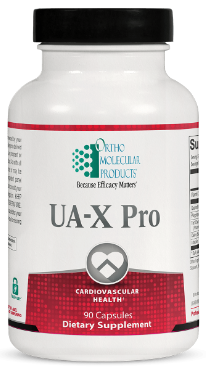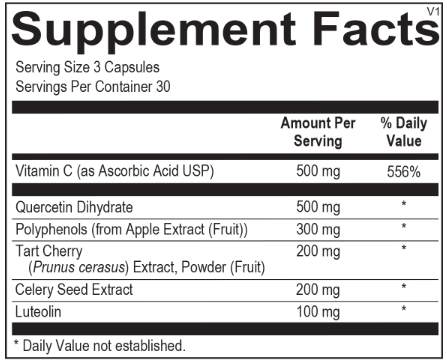- Barcode: 615033001643
- Vendor: Ortho Molecular Products
UA-X PRO
Product description
Item Description
More than a century ago, Scottish physician Alexander Haig sounded the alarm about the connection between uric acid levels in the body and cardiovascular health. Uric acid is the end item of purine metabolism in the human body and originates from catalysis by xanthine oxidase (XOD). Uric acid has a variety of physiological effects, including modulation of immune responses, regulation of blood pressure, and controlling the balance between antioxidants and prooxidants in the body. It is important to note that either overgeneration or reduction of uric acid can lead to an overabundance of uric acid.
The prevalence of uric acid in the population has increased rapidly in recent years and has a closely interdependent relationship with certain metabolic health challenges. According to the NHANES study, uric acid prevalence rates in the United States is 20.2% in men and 20.0% in women. Furthermore, serum uric acid is an independent biomarker of cardiometabolic health. Studies have clearly shown an association between increased uric acid concentrations and oxidative stress. This has been shown to be linked to cardiovascular health challenges. Reactive oxygen species (ROS) are generated in tandem with uric acid production; therefore, uric acid causes endothelial changes that require a large pool of antioxidants. Uric acid also modulates vascular endothelial function through the downregulation of nitric oxide production. UA-X Pro was crafted specifically to regulate both the production and the excretion of uric acid by supporting key metabolic enzymes in the liver and stimulating uric acid transporters in the kidney.
Vitamin C has long been known for its benefits in supporting the immune system. Vitamin C must be obtained from food because the human body cannot manufacture this nutrient. In a meta-analysis of randomized controlled trials containing 1013 participants, pooled findings showed that vitamin C supplementation has a significant impact on lowering serum uric acid levels. Furthermore, a 20-year study published in the Archives of Internal Medicine that including almost 47000 males found that those taking vitamin C had a 44% reduced incidence of uric acid.
How to Use
3 capsules per day or as recommended by your health care professional.





